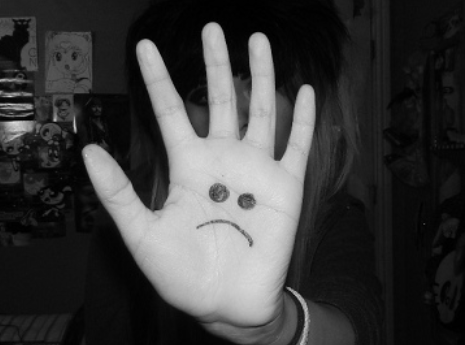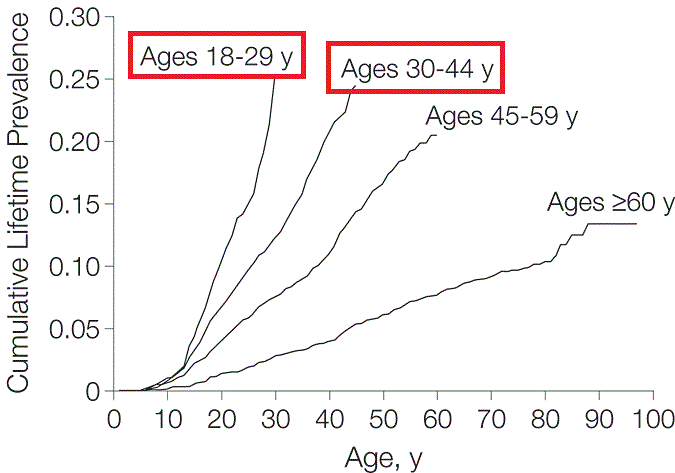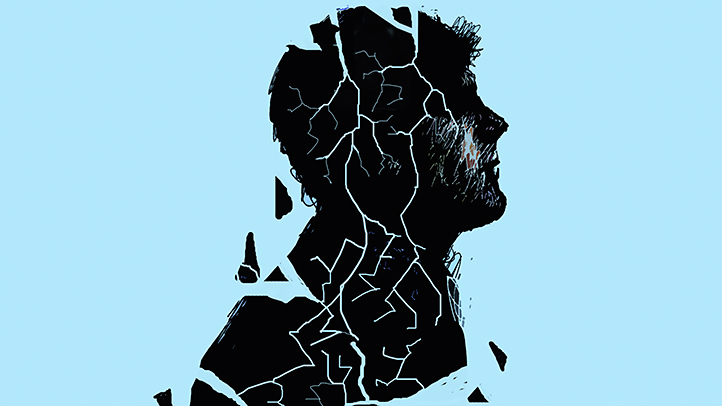IS THE CURE FOR DEPRESSION HIDDEN IN OUR BRAINS? [PART 1]

Source
From all of the world’s most prevalent diseases, depression has shown one of the most dramatic increases during the last years. The exact definition of this psychiatric condition is a very hard one to describe. On one hand you have the common, everyday adaptation of the word which is mostly used to characterize a general feeling of low mood and sadness. On the other hand we have the more clinical interpretation that psychologists and psychiatrists will give which is the one of Clinical Depression or according to the DSM-V, Major Depressive Disorder. Depression can be a debilitating disease. It affects people’s motivation, sleep, memory, relationships, work, concentration and sex life. According to the latest research, depression is now officially a global epidemic. Up to 30% of people in developed countries could be diagnosed with this disease at some point in their lives and the incidence is continuing to rise.

Ages 18-45 are especially vulnerable - Source
The validity of the diagnosis and the reliability of the DSM criteria are highly questionable and such a debate could make an entirely different article by itself. But no matter where you views stand on this matter, it is without question that depression is a major cause of human mental disability worldwide. It is estimated that 1 out of every 5 Westerners will receive a prescription for antidepressants at some point in their lives. Despite this, the prevalence of depression continues to rise. Recent researches also reveal some more worrying results. Prolonged depression has been shown to cause brain damage and inflammation throughout the whole body [1]. In addition, clinical depression has been associated with the ‘pain centres’ of the brain which can explain the physical torment and torture that many depressed individuals feel [2]. But the big question remains: What is causing this depression epidemic?
The answer lies within our brains and our genes. Just like in all inflammation related diseases of our modern civilization, such as atherosclerosis, diabetes, obesity and cancer, depression is a result of our newly adopted lifestyles. Our brains are trapped within a body which has been finely tuned by thousands of years of evolution to function in an environment that is entirely different than the one we currently live in. Humans were not designed to live a sedimentary, fast-paced lifestyle in an environment of abundance and social isolation. Evolution could have never predicted the industrial revolution that would change our societies forever. It originally designed us to hunt and gather our food, it made us desire social interactions and a family life while the only problem that our brains had time to be concerned with was that of our own survival. But if the cause of depression lies in the chaotic difference between our environment and biology, could the cure also be found within us?

SADNESS AND ANXIETY ARE IN FACT ABSOLUTELY NATURAL EMOTIONS

Our lives are constantly being bombarded with delusionary messages of optimism and positivity. We find ourselves in a world where feelings have become more important than truths, we value material goods more than we value being alive, we care more about getting our ‘dream job’ than finding one that will pay our bills. We are surrounded by fake images of how the ‘ideal’ life should be and we are made to believe that if we are not happy then there is something wrong with us. We are in a never ending pursuit of constant happiness that we do not really need in our lives. What we don’t understand is that happiness and sadness are nothing more than emotional, neurotransmitter based mechanisms that our brains use to encourage us in doing some things and discourage us from doing others. And most important of all, our ‘default state’ has never been one of happiness. We have been predominantly designed to worry, feel anxious, experience sadness with our failures and occasionally be rewarded with a quick dose of euphoric endorphins, serotonin and dopamine when we do something that improves our survival or reproductive chances. Feelings are like the clouds in the sky. Some are white and bright, some are dark and gray, some are small while others are big and take up the entire sky. But they all have one thing in common: they come and go.

Source
Instead of being taught how to be happy, we should learn how to embrace and accept our feelings of sadness and anxiety. They are part of the human world and they are here to help us. We need to have a rough landing back to the reality of life and understand our very own nature. Anthropologists have been studying for years primitive tribes which still survive on our planet. One publication after the other state how, despite the fact that these people experience the struggle for survival every day and live in conditions which will probably appear barbaric to us, they never report having any depression. The negative experiences and feelings of their lives are being treated as major parts of it and not as unwanted side effects. Unlike us, they don’t ‘withdraw’ into isolation on the first signs of sadness and they don’t engage into a constant rumination which traps them into a permanent struggle with their melancholy. They embrace it, they understand it, deal with it and fix whatever is causing it.

Source
Depression is a hugely complicated topic. It would be impossible to go through all the modern causes of it without writing an enormous article that nobody would have the patience to read. This is why I have decided to break this topic down into several smaller articles. In my upcoming posts I will write about how other lifestyle characteristics of our lives and our growing social isolation are also responsible for the depression epidemic and finally I will write how we can fight depression back without sacrificing the benefits that the modern civilization has to offer.

For Parts 2 and 3 but also many more articles like this, follow me @nulliusinverba

Excellent read. I don't know if you remember but I wrote about this very subject last year
Depression Is A Disease of Civilisation: Aboriginal Australians Hold The Cure
Thanks kyriacos! Yes, I do remember this article. I also watched recently an interesting TEDx lecture by Stephen Ilardi who is treating depression patients by discouraging the use of pills and promoting a general lifestyle change. He's had some good results, even though I have my doubts whether his techniques can be applied to larger populations.
very intresting to read
Thank you for reading!
My depression which was very bad was just loneliness . Being on a date, with a remote chance of it working out was enough to lift it. It was one of natures ways of forcing me to form relationships, otherwise I would not try. My depression was not a chemical imbalance.
Social isolation is a major cause of modern depression. Humans have evolved to live in groups, we are social animals. I'll cover that more in Part 2
Thats true. However I am 44 years old now. I don't feel as Lonely as I used to. I am almost content being by myself.
This is how you learn yourself and discover who you really are.
Any knowledge would have been little use as the depression was raw.
This is excellent. I've been dealing with anxiety, panic attacks and depression for most of my life. I just finished reading a book on coping mechanisms for panic attacks....Trying to avoid the fear of the physical sensations which causes the full blown attack. Your article reminds me of what I've read before regarding the link between depression and being disconnected from nature. I look forward to reading more from you!
I think most inflammatory diseases of our times are due to the fact that our bodies were simply made for a completely different environment than the one we live in. The other obvious example being of course obesity. I also think that we are dealing with depression in the completely wrong way. Pills don't really offer much. Whatever you give you the human brain, it will eventually develop tolerance towards it. In the cases that antidepressants do ''help'', it's usually with patients who would have improved anyway, with or without pills.
Depression and LYME disease go hand in hand. The number of people that have Lyme is probably around 50-60%. THEY DO NOT KNOW IT. Its also a gut issue that is connected to your brain
I have my doubts about your numbers. If you could provide citations, that would be great!
I deal with Lyme every day. You get Lyme or its co-infections through a bite of a TICK, MOSQUITO , flea, bed bug, spiders, mites, raw meat, from cats, from dogs, cows, the list is endless. People come in contact to at least one of these things. THE ONLY reason why some don't have it, the immune system kill it off. EASY 50% of the population have it. Lyme is DEMENTIA, MS, Parkinson, ALS, Sometimes AUTISM, tourettes. We have had ALL of these people..The bacteria may also live inside your cells in an "L-form" or coated as a cyst. The ability to change forms explains why diagnosis and treatment is so challenging and why recurrence of symptoms may result after standard antibiotic protocols. 100% have depression, after treatment its GONE..
nice post, I don't know much about depression, luckily, but this is very interesting
It definitely is an interesting topic! thanks for reading @trafalgar